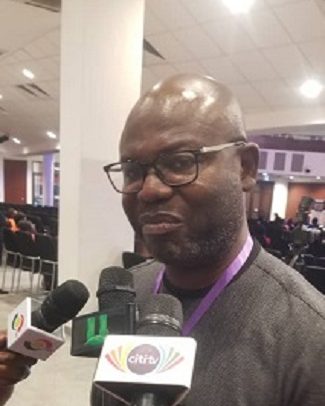Participants at the Global Super Teacher Conference. INSET: Grant Bulmuo
The Deputy Minister of Education, Rev. John Ntim Fordjour, has commended the Africa Education Gateway (AEG), an educational conglomerate instituted to provide the appropriate guidance to empower education-focused organisations for its innovative strategies, which has maximised service delivery within the sector.
Speaking at the 10th edition of the Global Super Teacher Conference (GSTC) organised by the AEG in Accra, Rev. Ntim Fordjour underscored the contribution of the Africa Education Gateway, in supporting the government efforts of transforming the various facets of the country’s educational system into a robust sector.
The minister noted that for a decade, the conference has provided the avenue for teachers and stakeholders in the educational sector, to share various innovations which include modern methods of imparting knowledge on their students.
This, he said, has resulted in the recent global recognition of Ghanaian students receiving numerous awards on various international platforms for their innovations.
“In Ghana, young children in their formative ages are innovating their way out and setting up aircraft that can be droned and go for surveillance. This is a testament to the kind of innovation we are introducing, while others are also competing in the global robotics competition and consistently coming home with the top awards,” he said.
Rev. Ntim Fordjour stated that the AEG has the capacity to prepare school children with the innovation they need to make remarkable strikes on the global stage.
The minister indicated that since the introduction of the Free SHS policy, government has doubled enrollment of BECE students to second cycle institutions. “With an average enrollment of 8,300 in 2016 to some 1.45 million, as we speak now we hope to do more in the coming days to give opportunity to everyone,” he added.
Speaking on the conference theme “Equity”, Programme Director of the African Education Gateway, Grant Bulmuo, indicated that there is a need to strengthen systems and structures in African countries and within schools to offer equitability and inclusivity for school leaders, teachers and learners.
He urged the government and other stakeholders in the educational sector to support schools irrespective of size and location, with resources and intervention.
“Equity-led leadership and governance will facilitate effective planning, offer broader participation of all in the education space to share and contribute towards underprivileged schools, classrooms, and subjects.”
“It will also promote equity-based learning for all through effective decentralised mechanisms and strategic distribution to ensure that no school, teacher, learner or community is excluded,” he added.
BY Prince Fiifi Yorke


